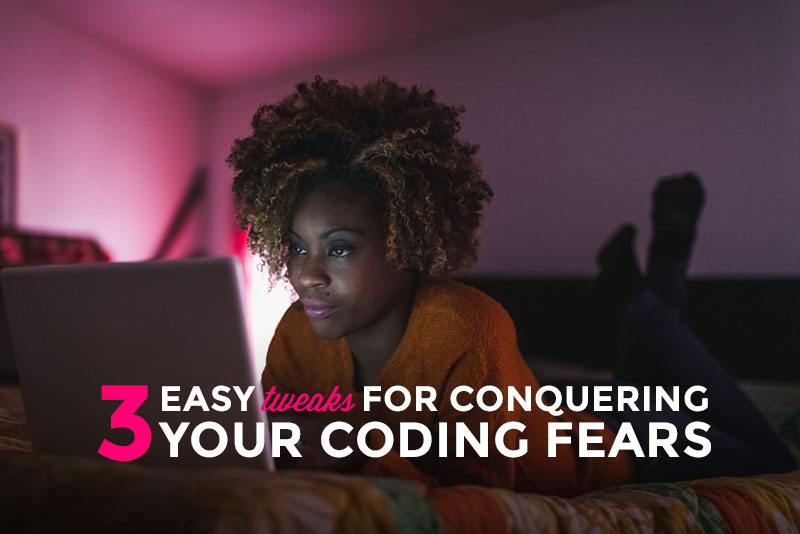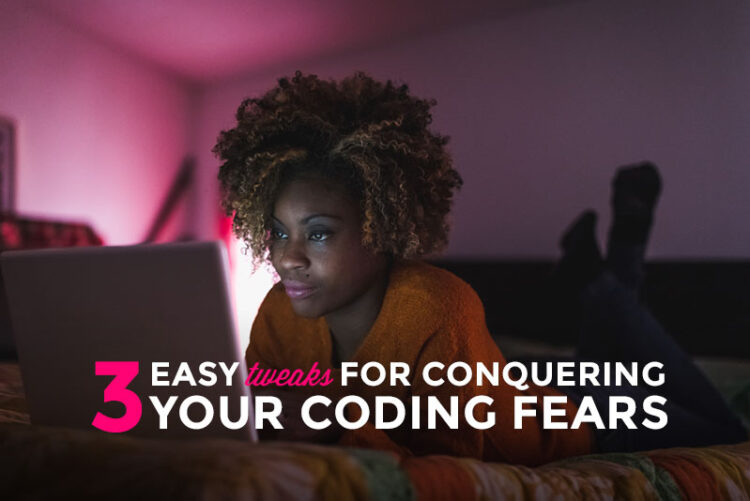
“WHAT IF I DON’T LIKE CODING?”
This is a question that I hear a lot. When I tell people about how I transformed my career and life by teaching myself to code, their reaction is usually either, “But I’m not a tech person,” or, “I don’t think I would enjoy coding.”
As far as the first objection is concerned — Well, don’t get me started on what it really means to be a tech person! Learning to code is actually about becoming a tech person.
But when it comes to the question of actually enjoying code, I get it. When I first started teaching myself to code, I wanted to love it. And I felt like I SHOULD love it. While I loved the feeling of having more control over my career and seeing my creations come to life, after the initial surge of excitement passed, I started struggling.
In this post, I’m going to cover:
- – How I let my anxiety overwhelm me while coding
- – The steps I took to stop the stress and learn to truly ENJOY coding again
- – A FREE, downloadable action plan with steps you can take today to start loving code
See, coding was stressing me out. Every time I tried to run some code, and it didn’t work, or I changed one thing and everything broke, I dealt with waves of anxiety.
The blood rushed to my head, my ears began to pound and my stomach twisted into a tight little knot. The angst and its accompanying physical discomfort — they were a regular occurrence. I re-introduced my head to my desk multiple times a week.
This was how I felt every time I got stumped when I was first learning to code. And that physical distress I went through made me wonder if I could ever be any good at coding.
Time and time again, I was ready to quit. Chalk up the last few months to a failed experiment, and finally admit that my worst fears were true: Nobody would ever pay me to code for them. I just didn’t have what it took. No chops.
Add to this stress the fact that the time I had to spend coding was limited: I had a full-time job and a full-time life. I’d get one, maybe two hours to dedicate to improving my technical skills per day. So, when stupid-simple problems ate up half an hour, then half an hour more, it was easy for me to feel like I’d never get anything done.
Worst of all: I felt constant, nagging anxiety nearly every day.
Would I ever be good enough? Would anyone actually hire me? Pay me to do what so many other people could already do so much better? Would I ever actually ENJOY coding??
Coding, I began to think, was not much fun at all.
After a few months of feeling this way, I decided it wasn’t for me. But no. I don’t mean that I determined that coding wasn’t for me! I mean the worrying part, the anxiety. The frustration and irritation.
So, I made a decision that I didn’t want to feel that way any more.
I resolved to overcome these issues and learn to make coding an enjoyable (rather than stressful) experience. As long as I let myself feel angst, I was never going to be productive and, more importantly, I was never going to feel the sense of accomplishment that should come with learning a new skill like coding.
Over the next few months and years, I learned a few ways to feel thrilled and excited about code. Instead of sitting at the computer with a mounting feeling of dread, I felt inspired to surge forward.
HOW DID I DO IT?
I didn’t get a web design guru to mentor me, quit my job and devote 18 hours a day to code, or go back to school for a computer science degree.
I changed the way I think about code in 3 simple ways.
It’s true! By changing the way I thought about learning to code, I found a way to make it a source of joy, self-satisfaction and (even!) some extra income. Here’s exactly how I changed my thinking and transformed the way coding fits into my life — and how you can do the same thing!
Thought Modification #1:
Consider Time To Be Abundant Instead Of Scarce
If you’ve already started coding, you know that sometimes the littlest things can seem to suck away all your time. And when it feels like the hourglass is running out, it’s hard to focus on the work at hand.
Instead of seeing time as a scarce resource — one that I had little control over — I began to consider its abundance. I thought about how much I could achieve in 5, 10 or 30 minutes.
I began to respect my abilities to achieve great things in short amounts of time.
When I thought about time as something that I had control over, something I could manipulate instead of be manipulated by, I got more done.
That meant that instead of feeling like I “wasted” an hour tweaking one tiny thing, I felt satisfied that in only an hour I had solved a problem that was giving me trouble.
HERE’S HOW YOU CAN DO THE SAME THING:
- – Make a list of 3 times each day when you could fit in 5 minutes of coding.
- – Schedule 15 minutes a day of coding on your calendar.
- – Try skipping or shortening a daily habit (like watching “mindless” TV or surfing Facebook) and doing some coding instead.
Thought Modification #2:
Focus On Finding Motivations Instead Of Eliminating Obstacles
“Don’t beat yourself up! You’re working so hard!” It’s good advice to give someone who is learning a new skill, but it only works for so long.
I found that “not beating myself up” just didn’t work. Simply dismissing thoughts, or suppressing them, was temporary. They always came up again, accompanied by a sense of defeat.
So I stopped fixating on trying to eliminate unhelpful feelings and emotions. Instead, I focused on how much I enjoyed learning.
Enjoyment is a huge motivator. It isn’t quite a goal — it can’t be measured. But it is something that most of us strive to achieve every day: to enjoy life, and everything in it, including learning to code!
Motivating myself in a positive rather than negative way worked wonders. Instead of thinking about all the ways I could stop struggling, I was thinking about all the ways I could enjoy my daily successes.
Here’s how you can do the same:
- – Write down 10 reasons you enjoy coding or benefits you get from it.
- – Find 1 way to have a good time with code each week. (Teach your niece some CSS or play some coding games — even simple ones)
- – Meet up with other coders to share your positive experiences and talk about your progress and projects.
- Thought Modification #3:
Gain Control Over Situations By Planning Ahead
You know that feeling when you hit a seemingly unsolvable problem?
The racing heart, pounding brain, sweaty palms, and — worst of all — the tunnel vision.
Our physiology reacts this way when we feel out of control. We enter fight-or-flight mode, nerve cells rapid-firing and the bloodstream coursing with adrenaline, noradrenaline and cortisol.
If this reaction is caused by feeling out of control, naturally the solution would be to regain control. But how can you do that, especially when you’re trying to get control of something like GitHub or jQuery plugins?
I found it was very helpful to choose an activity ahead of time, something unrelated, like cleaning the kitchen. I wrote it down and posted it somewhere visible from my seat at the computer. Then I planned to do that activity the next time I hit a problem to distract myself and take a break from the stress of not getting something right away.
And it worked great!
I’d get stumped and begin to feel frustrated and angry. But when I saw that visual trigger — the paper on the wall where I had written “clean the kitchen” — I’d immediately calm down.
It didn’t really matter what that activity was — cleaning the kitchen, going for a walk, taking a 5-minute reading break. All I needed was the assurance that I had planned for the situation. That I knew it was going to happen ahead of time and I could control something, if not everything.
HOW YOU CAN DO THE SAME:
- -Write down positive activities (like cleaning the kitchen, going for a walk, taking a reading break) to do when you’re stuck.
- – Pick out a few easier, routine tasks that are related to coding (like checking for syntax errors or reviewing some online lessons you’ve done earlier) and plan to do one the next time you feel overwhelmed.
- – Have a “code buddy” you can contact for support or advice when you start to feel out of control.
THE RESULTS
Even the smallest changes in my thoughts had an immediate impact on my behavior. I noticed enormous and positive differences in my productivity, sense of well-being and satisfaction with my progress.
I ceased to mindlessly refresh Facebook or idly clean my desk.
My learning trajectory improved. Tough coding problems ceased to be problems and were instead fun puzzles.
In other words, the #1 secret to success in learning to code turned out to be, for me at least, becoming a master at fine-tuning my brain to produce effective thoughts.
Joyce Akiko helps self-taught coders know when and how to find their first freelance clients so they can work for themselves, call their own shots, and experience freedom and flexibility every day. Download her eBook “How To Transition Into Tech With Self-Taught Skills”, completely free for Skillcrush readers.



